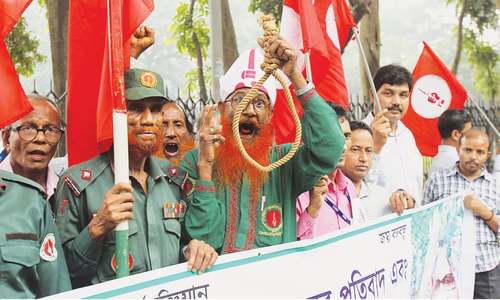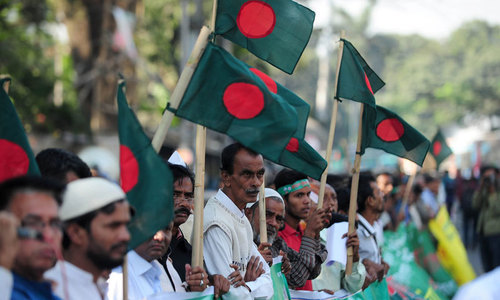NEW DELHI: Bangladesh executed two influential opposition leaders on charges of war crimes during the country's 1971 independence war, a senior jail official said Sunday, despite concerns that the legal proceedings against them were flawed and threats of violence by their supporters.
Bangladesh Nationalist Party leader Salahuddin Quader Chowdhury and Jamaat-e-Islami secretary general Ali Ahsan Mohammad Mujahid were "hanged together, at the same time" at 12:55 am at Dhaka Central Jail in the nation's capital, Senior Jail Superintendent Mohammad Jahangir Kabir told The Associated Press.
Security was strengthened near the jail and elsewhere to avoid any violence. A few hours after the execution, a security detail escorted ambulances carrying the men's bodies to their ancestral homes where their families were to perform burial rituals.
The Jamaat-e-Islami party, whose two other senior leaders already have been executed on war crimes charges, issued a statement calling for a nationwide general strike on Monday.
Chowdhury was convicted on charges of torture, rape and genocide during the country's independence war, while Mujahid was found guilty on charges of genocide, conspiracy in killing intellectuals, torture and abduction.
On Wednesday, Bangladesh's Supreme Court upheld their death sentences, and on Saturday, President Mohammad Abdul Hamid rejected a clemency appeal, clearing the way for the executions.
The families of Chowdhury and Mujahid met them for the last time inside Dhaka Central Jail on Saturday evening, authorities said.
Jamaat-e-Islami and the Bangladesh Nationalist Party say the trials were politically motivated. Prime Minister Sheikh Hasina has denied the allegations.
She has acknowledged that she faced international pressure for trying opposition figures for war crimes, but vowed to continue the trials "to ensure justice for the families of the slain people" from the 1971 war.
More than 15 people, mostly leaders of Jamaat-e-Islami, have been convicted of war crimes. The party had campaigned openly against independence for Bangladesh.
The United States (US) State Department said Friday that executions should not take place until it is clear the trial process meets international standards.
Stephen Rapp, who until August served as President Barack Obama's ambassador for war crimes, said it was "disturbing" that Chowdhury was denied the right to call alibi witnesses, including a former US ambassador, to provide testimony that he was not present in Bangladesh at the time the alleged crimes were committed.
Human Rights Watch said the tribunal allowed the prosecution to call 41 witnesses, while Chowdhury's defence was limited to four witnesses. The New York-based group said Mujahid was sentenced to death for instigating his subordinates to commit abuses, although no subordinates testified or were identified.
Leaders of the US House Foreign Affairs Committee, in a letter sent Tuesday to the top US diplomat for South Asia, voiced concern that "democratic space is shrinking" in Bangladesh amid "a growing climate of violence, fear and self-censorship."
Since February, four secular bloggers, a publisher, and two foreigners ─ an Italian aid worker and a Japanese agriculture researcher ─ have been killed in attacks linked to militants.
The self-styled Islamic State claimed responsibility for some of the attacks, but authorities say the militant group has no presence in the country.
Instead, Hasina has blamed the attacks on the Bangladesh Nationalist Party and Jamaat-e-Islami, accusing them of trying to destabilise the country and halt the war crimes trials. Both opposition parties denied the allegation.
Such extremist violence was once rare in Bangladesh, which is mostly Muslim but has a strong secular tradition.














































